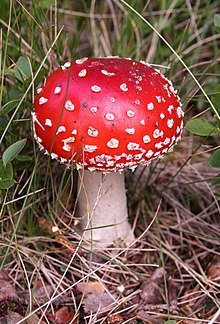Mushroom
A mushroom (also called a toadstool) is the part of a fungus that is comparable to the fruit of a plant. Unlike plants, mushrooms do not use sunlight to generate energy for themselves. Some mushrooms are edible, and are used for cooking in many countries, such as China, Korea and Europe. Other mushrooms, however, are poisonous, and can cause severe illness or death if eaten. People who search for edible mushrooms are called mycophagists, meaning "mushroom eater", while the act itself is called "mushrooming".[1] Mushrooms have been known to support bone health and to regulate blood sugar in diabetics. It is available in different colours and shapes.[2]
| Mushroom | |
|---|---|

| |
| The toxic mushroom Amanita muscaria, commonly known as "fly agaric." | |
| Scientific classification | |
| Kingdom: | |
| Division: | |
Kinds of mushrooms
change- Agarics (includes very poisonous, and hallucinogenic kinds)
- Boletus (includes poisonous and edible kinds)
- Chanterelles (edible)
- Coral fungi (usually edible)
- Cap fungi (usually edible) [citation needed]
- Jelly fungi (usually edible)
- Polypores (similar to boletes)
- Psychedelic (also known as shrooms)
- Puffballs (usually edible)
- Stinkhorns (usually edible, but has a stench)
- Tooth fungi
Structure of mushrooms
changeMost mushrooms have a stem and a cap. The bottom of the cap usually has gills to hold spores, however, some mushrooms, such as the Porcini, have pores under the cap.
References
change- ↑ Metzler, Susan; Metzler, Van (January 1992). Texas mushrooms: a field guide. ISBN 9780292751255. Retrieved 23 December 2010.
- ↑ Bisht, Manish Singh (2020-09-03). "7 Mushroom Benefits which Makes you Healthy". Early Natural. Retrieved 2020-09-03.
Other websites
change| Definitions from Wiktionary | |
| Media from Commons | |
| News stories from Wikinews | |
| Quotations from Wikiquote | |
| Source texts from Wikisource | |
| Textbooks from Wikibooks | |
| Learning resources from Wikiversity | |
Identification
change- Mushroom Expert
- MykoWeb
- An Aid to Mushroom Identification, Simon's Rock College
- Online Edible Wild Mushroom Field Guide
- Mushroom Observer (mushroomobserver.org), a collaborative mushroom recording and identification project
- list of field guides to mushrooms Archived 2012-03-05 at the Wayback Machine, from the International Field Guides database
Research associations
change- Mushroom Mania; the Newsletter Archived 2010-10-18 at the Wayback Machine
- North American Mycological Association
- International Society for Mushroom Science Archived 2009-11-24 at the Wayback Machine
- Pacific Northwest Fungi Online Journal Archived 2010-01-31 at the Wayback Machine